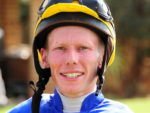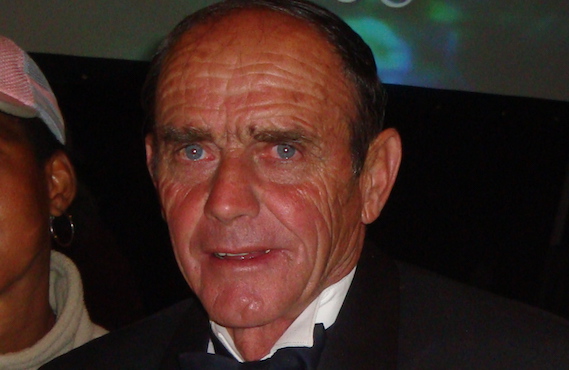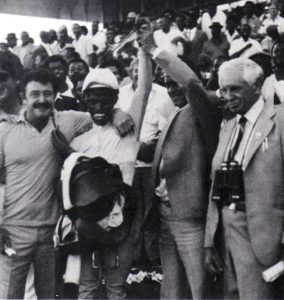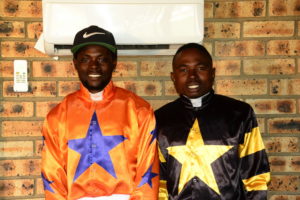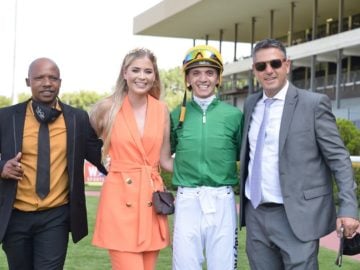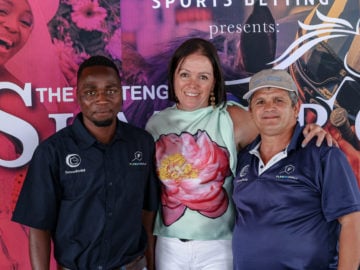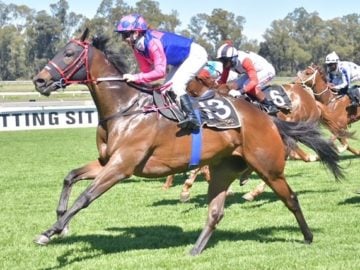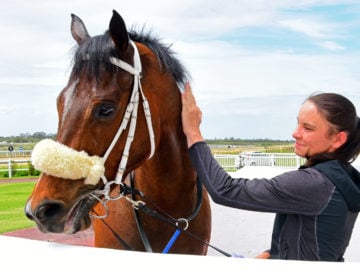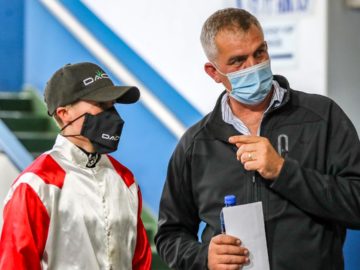When the Equus Panel chose to cancel the award for media at this year’s Awards evening, the Sporting Post, in conjunction with Drakenstein Stud Farm and the support of industry leaders such as Barry Irwin (who stepped in to judge) decided to hold an independent media award.
The award attracted 36 entries from 22 individual contributors and on 15 August, Hans Ebert, known to racing fans around the world from his Racing B*tch blog, was selected as the winner for his piece on Douglas Whyte.
Timing
The timing could not be more fortuitous with Hong Kong having thrown its weight behind South African export efforts and it is yet another tie to a country that has been incredibly welcoming and hospitable to South African horses and riders going back decades.
On receiving his award, Hans said, “To me, it’s an extremely international award. It’s held in South Africa and judged by an American. The story is about a South African jockey, written by a Hong Kong-based writer who was born in Ceylon – which is probably one of the first places to have held horse racing in Asia. It reinforces the strong bond that Hong Kong has had with South African riders especially, going back to the days of Bartie Leisher and spanning the likes of Jeff Lloyd, Basil Marcus, Robbie Fradd, Felix Coetzee, Dougie Whyte, Anthony Delpech, Anton Marcus, etc. right up to today where we’ve got Karis Teetan and have just had Callan Murray. The award brings the two racing jurisdictions together – and the message goes well beyond those two.”
Rather than taking receipt of the R20,000 cash prize, Hans chose to leave it in South Africa and see how he could put it to best use. As the winning entry had been about Douglas Whyte, he specifically wanted to apply it to a race riding initiative and preferably something related to skills development, which led him to James Maree’s work rider programme. As there is already an industry funded work rider series with a cash incentive for the winner, Hans decided to create a Work Rider Award and name it in honour of Douglas Whyte.
Why this programme?
Mr Maree was named SA Champion Jockey for the 1965/66 season and was Transvaal champion several times. Career highlights included the Rothmans July on Court Day, the J&B Met on Ding Dong and six SA Derbies.
During his riding career, Maree purchased and slowly developed his Alewynspoort training centre south of Johannesburg and when he hung up his riding boots after a bad fall, he moved over to training in 1980.
Mr Maree has always been a passionate horseman and one of the issues close to his heart was that the standard of grooms was not as good as it should be. “We pay such a lot of money for our horses and we were putting on these blokes who had no real understanding of what they were doing. I felt something needed to be done to help them and the horses.”
Rather than just lament the situation, he decided to do something to remedy it and established his Work Rider programme. It took a fair amount of work and persistence, but eventually, with the support of people like Mary Slack and Alison Mackenzie, he succeeded.
Work Rider Programme
The initiative started out with modest ambitions of just teaching the basics, but has grown into a four month entry level course, which is open to all grooms from the local centres. There are no fees – the programme just requires a groom to be nominated by a trainer. The course is offered three times a year and covers basic work riding, a bit of pace work and ensuring that the riders are genuinely in control of the horse. Mr Maree places a lot of emphasis on the correct seat and ensuring that riders are sitting in the right place and are correctly balanced.
The course is demanding time-wise and because grooms need to fit it around their full time jobs, it requires a lot of commitment. Attendees are collected by bus at around 11am and taught both practical and theory lessons, they have lunch and are returned to their yards by around 2pm. Any riders that are deemed sufficiently talented and dedicated, are invited back for the advanced course, which encompasses jumping out of starting stalls, placing horses in a race as well as more advanced race riding techniques such as how to change whip hands and ride a driving finish and the intricacies of tactical riding.
Work Rider Series
To complement the training programme, Mr Maree felt it was important for work riders to understand the demands of a real racing situation, as well as to be given the opportunity to earn riding fees, and succeeded in organising the first work riders’ race at Newmarket on 20 March 1985. It was won by Piet Nhlapo for the Maree stable aboard Taxizato. The Nhlapo family still live at Alewynspoort and are still close to James.
He has since been successful in implementing a sizeable number of work riders’ races per year and three entire race days dedicated solely to work riders. Work Rider race days have been built into the World Riders’ Challenge. Backed by the Racing Trust, the Racing Association and Phumelela, Mr Maree’s programme is one of the local racing industry’s best examples of B-BBEE, CSI and skills development. It is warmly supported by some of the top yards in the country is something our industry can rightly be proud of.
In addition to his sterling work in growing and developing our work riders, Mr Maree has also been instrumental in helping develop a number of our apprentice riders and the industry perhaps owes him more than we realise. As such, it was particularly fitting to create an award specifically for his programme.
The Douglas Whyte Award
In consultation with Mr Maree, it was decided to make the award in the form of a set of racing kit. Thanks to the generosity of Drakenstein Stud Farm, it was also to split the award across two deserving riders. The selection was made based on a combination of talent as well as dedication and Mr Maree was proud to nominate Joe Gwingwizha from the Sean Tarry yard and Phelisile Mongqawa from the Paul Peter yard.
Mr Maree confirmed that Joe has been a work rider for Sean Tarry for a number of years and is a hard working individual. “Joe is a real gentleman with a positive attitude and displays consistency on a daily basis. Joe is always happy to acknowledge and accept feedback and is open to any advice regarding his riding. Joe has demonstrated that he continually performs and achieves great results at race meetings. He is very committed and dedicated to his profession as a work rider and strives to always give his best.”
Phelisile Mongqawa has worked for the Paul Peter yard for a number of years and is a very committed and dedicated individual. Mr Maree says, “With his driven personality, Phelisile is ambitious to reach the top of his profession. Phelisile demonstrates punctuality and is loyal at work and will go the extra mile to be successful. He is a well-balanced work rider and has done well during race meetings. He continues to demonstrate that he is a strong and aggressive rider and this has led to positive results for this young man.”
It is a credit to both trainers to be developing and fostering work riders of this calibre.
Hand Over
Thursday, 19 October 2017 saw the first leg of this year’s Work Rider series. Joe and Phelisile both had carded rides, with Phelisile winning races 3 and 7 as well as finishing 3rd in race 4. Mr Maree kept the award as a surprise, arranging a special presentation after race 5 during which he presented each recipient with a new saddle. They will also be fitted for a skull cap and body protector in due course.
In closing, Hans commented, “As a writer, one hopes to inform and inspire, so I am pleased to be able to use the award to endorse and hopefully inspire the current and future students of James Maree’s Thoroughbred Racing Development Centre. Work riders are some of the unsung heroes of the racing world, who do so much to develop and produce the horses that in their turn, inspire the rest of us. My article was based on my long-standing friendship with Dougie Whyte, so it gives me great pleasure to create this legacy in Douglas’ name and continue the friendship between South Africa and Hong Kong. It is my hope that the creation of this award may serve to strengthen ties and create opportunities between our racing jurisdictions. Perhaps it may even pave the way to creating a global appreciation and platform for work riders in the future.”
‹ Previous
